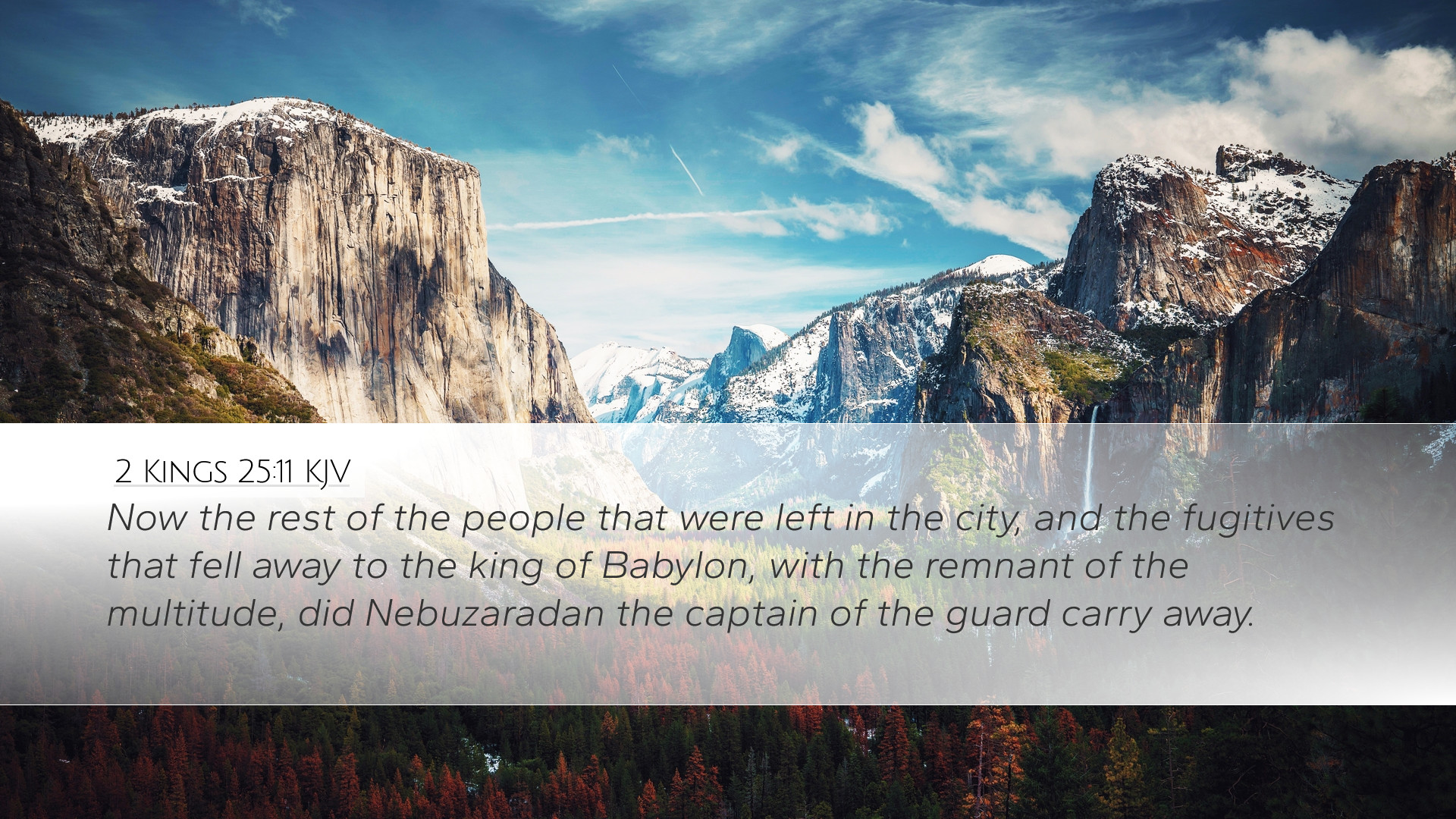Commentary on 2 Kings 25:11
Verse: 2 Kings 25:11 - "Now the rest of the people that were left in the city, and the fugitives that fell away to the king of Babylon, and the rest of the multitude, did Nebuzaradan the captain of the guard carry away."
Contextual Overview
This verse occurs during the climax of the Babylonian siege of Jerusalem, which culminated in the destruction of the city and the temple in 586 B.C. The fall of Jerusalem marked a significant turning point in Israel's history. The deportation of its inhabitants to Babylon underscored the prophetic warnings delivered by Jeremiah and other prophets regarding the consequences of idolatry and disobedience.
Commentary Insights
Historical Significance
Matthew Henry emphasizes the divine judgment reflected in the Babylonian exile. He points out that the exile was not merely a political event but a fulfillment of God's earlier warnings. The captives were the remnant left after the devastation of Jerusalem, highlighting both the severity of God's judgment and His ongoing plans for restoration.
Albert Barnes expands on the destruction of Jerusalem, noting that the actions of Nebuzaradan were not only a military success but also a final act of God’s discipline against Israel's persistent rebellion. The captives included those who had remained in the city during the siege, illustrating the complete desolation that had befallen Jerusalem.
Adam Clarke further elaborates on the fate of these captives. He notes that this verse encapsulates the result of ignoring God’s call to repentance. The remnant, rather than being a people of faith, are portrayed as those who either surrendered to the invaders or were too weak to resist.
Theological Implications
The exodus into Babylon shows the serious implications of sin and the consequences of turning away from God. Matthew Henry reflects on the grace found even in judgment, as God retained a remnant to preserve the covenant. This preservation would pave the way for future redemption and restoration.
Albert Barnes emphasizes the mercy within judgment, asserting that God can achieve His purposes through seemingly adverse circumstances. The deported individuals would later serve as the vessels for God's plan in Babylon, leading to their eventual return and rebuilding.
Adam Clarke notes that this verse serves as a stark reminder to the church today about the importance of fidelity to God. He highlights that disobedience can lead to severe consequences, yet even in tragedy, God’s plan for redemption and return remains intact.
Lessons for Today
- Divine Sovereignty: This passage affirms God’s control over historical events. In times of turmoil and suffering, believers are reminded of God's ultimate authority.
- The Importance of Repentance: The narrative urges both individuals and communities to heed God’s calls to repentance to avoid falling into despair and judgment.
- Hope in Times of Despair: The fate of the remnant encourages believers to maintain hope in God’s redemptive purposes, even amidst judgment and destruction.
- God’s Faithfulness: Despite Israel's failings, the preservation of a remnant showcases God’s faithfulness to His covenant and plan for eventual restoration.
Conclusion
The events of 2 Kings 25:11 not only depict the historical reality of the Babylonian captivity but also resound with profound spiritual truths. As pastors, theologians, and students of the Word, there is much to glean from this passage in terms of understanding God's nature, the consequences of sin, and the unfailing hope of redemption. Engaging with this text invites deeper reflection on God's sovereignty and mercy, encouraging an application of these lessons into both personal and communal faith practices.


